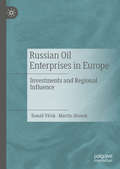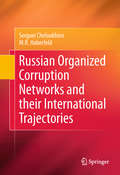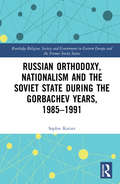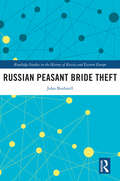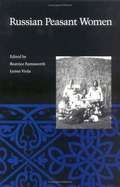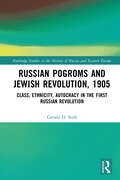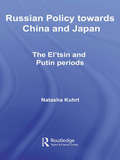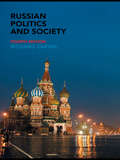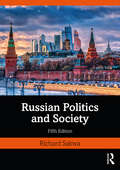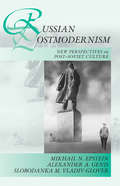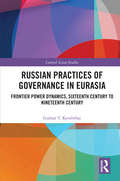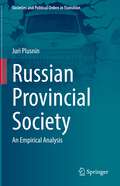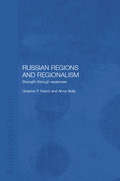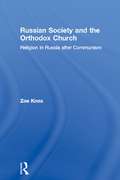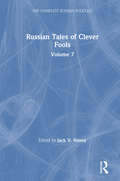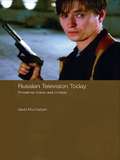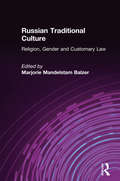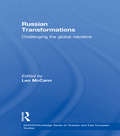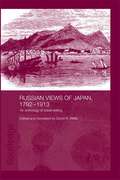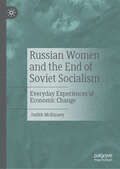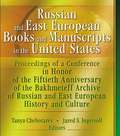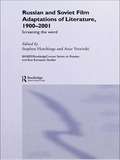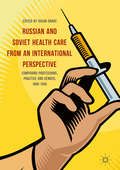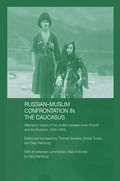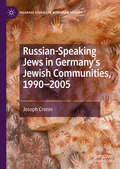- Table View
- List View
Russian Oil Enterprises in Europe: Investments and Regional Influence
by Tomáš Vlček Martin JirušekThis book analyzes motivation, investments, and influence of the Russian Federation and Russian companies in the European oil sector, specifically, the Southeastern Europe. The main idea of the book is to highlight economic and political logic of the Russian activities in the oil sector as well as to provide a brief analysis of the situation in the natural gas sector. The findings help to understand the general code of conduct of Russian energy companies and their potential ties to their homeland government. This project will appeal to academics, researchers, graduate students, field professionals, and everyone who is interested in Russian and European geopolitics.
Russian Organized Corruption Networks and their International Trajectories
by M. R. Haberfeld Serguei CheloukhineCountries undergoing major social and legal transitions typically experience a light, but relatively insignificant, increase in crime. However, in the past decade, many transitional countries in Eastern Europe, and Russia in particular, have experienced a surge in criminal activities that came about through the collaboration of diverse players--such as criminals, state officials, businesspersons, and law enforcement--into organized networks aimed to obtain financial and economic gains.
Russian Orthodoxy, Nationalism and the Soviet State during the Gorbachev Years, 1985-1991 (Routledge Religion, Society and Government in Eastern Europe and the Former Soviet States)
by Sophie KotzerThis book examines how the Russian Orthodox Church developed during the period of Gorbachev’s rule in the Soviet Union, a period characterised by perestroika (reform) and glasnost (openness). It charts how official Soviet policy towards religion in general and the Russian Orthodox Church changed, with the Church enjoying significantly improved status. It also discusses, however, how the improved relations between the Moscow Patriarchate and the state, and the Patriarchate’s support for Soviet foreign policy goals, its close alignment with Russian nationalism and its role as a guardian of the Soviet Union’s borders were not seen in a positive light by dissidents and by many ordinary believers, who were disappointed by the church’s failure in respect of its social mission, including education and charitable activities.
Russian Peasant Bride Theft (Routledge Studies in the History of Russia and Eastern Europe)
by John BushnellThis book explores the history of Russian peasant bride theft - abduction, capture - from the adoption of Christianity in Kievan Rus in the late tenth century to the very early twentieth century. It argues that bride theft in eighteenth and nineteenth century Russia was practised in large part by, but not exclusively by, Old Believers, the schismatics who rejected the Church reforms of the mid-seventeenth century and shunned contact with the Orthodox Church; and that the point of bride theft, where the bride was often a willing party, often married secretly at night by an Orthodox priest acting illegally, was to absolve the bride and her parents of the responsibility for engaging in a formal Orthodox ritual which Old Believers regarded as sinful. The book also considers how bride theft originated much earlier in Russia and was a continuing tradition in some places, and how all this fitted into the Russian peasant economy. Throughout the book provides rich details of particular bride theft cases, of Russian peasant life, and of Russian folklore, in particular bridal laments.
Russian Peasant Women
by Beatrice Farnsworth Lynne ViolaAn overview of the forces - economic, social, and ideological - that shaped and transformed Russian peasant society, especially the position of women in it, from the early 19th century to the present.
Russian Pogroms and Jewish Revolution, 1905: Class, Ethnicity, Autocracy in the First Russian Revolution (Routledge Studies in the History of Russia and Eastern Europe)
by Gerald D. SurhThis book, based on extensive original research, examines the widespread and violent pogroms against Jews which took place in the Russian Empire in 1905. It briefly surveys the earlier history of Jews in the Russian Empire and the discriminatory policies against them. The work outlines the extent of the killings and lootings in 1905, explores the role of the authorities who were often neutral or complicit in the violence, and highlights Jewish self-defense measures. It relates the pogroms to the place of the Jews in Russian urban and rural life, to social change and modernisation, and to the revolutionary events of 1905, in which Jews played a prominent role, and during which calls for ethnic self-determination arose among many nationalities of the Russian Empire, most broadly and consequentially among Jews. Overall, the book views the pogroms as a consequence not only of Russian antisemitism, but of the broader, revolutionary breakdown of Russian state and society in 1905.
Russian Policy towards China and Japan: The El'tsin and Putin Periods (BASEES/Routledge Series on Russian and East European Studies #Vol. 42)
by Natasha KuhrtDrawing on the most up-to-date sources, this book provides an in-depth examination of Russia’s relations with China and Japan, the two Asia-Pacific superpowers-in-waiting. For Russia there has always been more than one ‘Asia’: after the collapse of the Soviet Union, there were those in the Russian elite who saw Asia as implying the economic dynamism of the Asia-Pacific, with Japan as the main player. However there were others who saw the chance for Russia to reassert its claim to be a great power, based on Russia’s geopolitical and geoeconomic position as a Eurasian power. For these, China was the power to engage with: together China and Russia could control both Heartland and Rim, both Eurasia and Asia-Pacific, whereas accepting Japan’s conception of Asia implied regional fragmentation and shared sovereignty. This book argues that this strand of thinking, mainly confined to nationalists in the El’tsin years, has now, under Putin, become the dominant discourse among Russian policymakers. Despite opportunities for convergence presented by energy resources, even for trilateral cooperation, traditional anxiety regarding loss of control over key resource areas in the Russian Far East is now used to inform regional policy, leading to a new resource nationalism. In light of Russia’s new assertiveness in global affairs and its increasing use of the so-called ‘energy weapon’ in foreign policy, this book will appeal not only to specialists on Russian politics and foreign policy, but also to international relations scholars.
Russian Politics and Society
by Richard SakwaHaving been fully revised and updated to reflect the considerable changes in Russia over the last decade, the fourth edition of this classic text builds on the strengths of the previous editions to provide a comprehensive and sophisticated analysis on Russian politics and society. New to this edition: extended coverage of electoral laws, party development and regional politics new chapter on the 'phoney democracy' period, 1991-93 historical evaluation of Yeltsin's leadership full coverage of Putin's presidency discussion of the development of civil society and the problems of democratic consolidation latest developments in the Chechnya conflict more on foreign policy issues the re-introduction of the Russian Constitution as an appendix an updated Select Bibliography more focus on the challenges facing Russia in the twenty-first century. Written in an accessible and lively style, this book is packed with detailed information on the central debates and issues in Russia's difficult transformation. This makes it the best available textbook on the subject and is essential reading for all those concerned with the fate of Russia, and with the future of international society.
Russian Politics and Society
by Richard SakwaFully revised and updated to reflect the considerable changes in Russia over the last decade, the fifth edition of this classic text builds on the strengths of previous editions to provide a comprehensive and sophisticated analysis of Russian politics and society. The new edition incorporates the latest debates about Russian politics, analysing recent institutional and political developments, and examines the electoral cycle and prospects of the president elected at the end of the process. New to this edition: an evaluation of Putin’s leadership and the country's political performance under him; updated election results and demographic, social, ethnic/national statistics to include results of the 2010 census; changes in the party system, to electoral legislation and to the composition of parliament as well as the relationship between the executive and legislature; coverage of the constitutional changes and governmental appointments under the various prime ministers; more analysis of economic performance including discussion of the energy sector and pipeline politics; changes in Russian foreign policy since EU enlargement, its relationship with NATO since the ‘reset’, as well as its relations with post-Soviet states; assessment of the military reforms and security and defence policy; debates over the question of democracy in Russia today, the nature of the system, and its future prospects. Written in an accessible and lively style, this book is packed with detailed information on the central debates and issues in Russia’s difficult transformation. An unrivalled textbook on the subject it is essential reading for all those concerned with the fate of Russia, and with the future of international society.
Russian Postmodernism
by Mikhail N. Epstein Alexander A. Genis Slobodanka Millicent Vladiv-GloverRecent decades have been decisive for Russia not only politically but culturally as well. The end of the Cold War has enabled Russia to take part in the global rise and crystallization of postmodernism. This volume investigates the manifestations of this crucial trend in Russian fiction, poetry, art, and spirituality, demonstrating how Russian postmodernism is its own unique entity. It offers a point of departure and valuable guide to an area of contemporary literary-cultural studies insufficiently represented in English-language scholarship. This second edition includes additional essays on the topic and a new introduction examining the most recent developments.
Russian Practices of Governance in Eurasia: Frontier Power Dynamics, 16–19th Century (Central Asian Studies)
by Gulnar T. KendirbaiThis book analyses the role of the mobility factor in the spread of Russian rule in Eurasia in the formative period of the rise of the Russian Empire and offers an examination of the interaction of Russian authorities with their nomadic partners. Demonstrating that the mobility factor strongly shaped the system of protectorate that the Russian and Qing monarchs imposed on their nomadic counterparts, the book argues that it operated as a flexible institutional framework, which enabled all sides to derive maximum benefits from a given political situation. The author establishes that interactions of Russian authorities with their Kalmyk and Qazaq counterparts during the mid-16th to the mid-19th centuries were strongly informed by the power dynamics of the Inner Asian frontier. These dynamics were marked by Russia’s rivalry with Qing Chinese and Jungar leaders to exert its influence over frontier nomadic populations. This book shows that each of these parties began to adopt key elements of existing steppe political culture. It also suggests that the different norms of governance adopted by the Russian state continued to shape its elite politics well into the 1820s and beyond. The author proposes that, by combining key elements of this culture with new practices, Russian authorities proved capable of creating innovative forms of governance that ended up shaping the very nature of the colonial Russian state itself. An important contribution to the ongoing debates pertaining to the nature of the spread of Russian rule over the numerous populations of the vast Eurasian terrains, this book will be of interest to academics working on Russian history, Central Asian/Eurasian history and political and cultural history.
Russian Provincial Society: An Empirical Analysis (Societies and Political Orders in Transition)
by Juri PlusninThis book presents a unique analysis of modern Russian provincial society. Based on detailed empirical evidence, it develops a theoretical model of Russian provincial society in the late 20th century and the early 21st century. The book explains how under the conditions of catastrophic changes, Russian provincial societies have undergone a structural transformation. It further sheds light on the transformation of the economic behavior of the population and households with regard to economic practices, crafts, and revived archaic forms of labor behavior. Summarizing the extensive empirical evidence, the book puts forward the concept of complementarity of two social structures at the local level: a ground "soft communal" structure and a "tightening with an iron hoop" estate state structure. Next, it discusses the stability and resistance of the local social structure to external political disturbances. Based on the presented analysis, the book introduces several independent criteria on the basis of which it establishes the typology of all empirically observed forms of societies. Subsequently, the book identifies six main types of Russian provincial societies. It explains how depending on the type, the different societies either adapt to political and economic changes in different ways, stay unchanged or transform their structure. The book will appeal to students, scholars, and researchers of economics, political science, sociology, and anthropology, interested in a better understanding of transformation studies, population and household economics, provincial societies, as well as Russian societal structures.
Russian Regions and Regionalism: Strength through Weakness
by Graeme P. Herd Anne AldisThe emergence of large regions within Russia as centres of gravity for political and international power, and the changing relationship between these emerging regions and the centre are critically important factors currently at work within Russia. This book examines the whole question of Russian regions and regionalism. It considers important themes related to regionalism, including demography, security, military themes and international relations, and looks at a wide range of particular regions as case studies. It discusses the extent to which regions have succeeded in establishing themselves as centres of power, and assesses the degree to which President Putin is succeeding in incorporating regions into a hierarchy of power in which the primacy of the centre is retained.
Russian Society and the Orthodox Church: Religion in Russia after Communism (BASEES/Routledge Series on Russian and East European Studies #Vol. 13)
by Zoe KnoxRussian Society and the Orthodox Church examines the Russian Orthodox Church's social and political role and its relationship to civil society in post-Communist Russia. It shows how Orthodox prelates, clergy and laity have shaped Russians' attitudes towards religious and ideological pluralism, which in turn have influenced the ways in which Russians understand civil society, including those of its features - pluralism and freedom of conscience - that are essential for a functioning democracy. It shows how the official church, including the Moscow Patriarchate, has impeded the development of civil society, while on the other hand the non-official church, including nonconformist clergy and lay activists, has promoted concepts central to civil society.
Russian Tales of Clever Fools: Complete Russian Folktale
by Jack V. HaneyThis is the concluding installment of a splendid multi-volume work that makes available to English readers a rich folktale tradition that has not been easily accessible or well-known in the West. Compared to other European traditions, the East Slavs have an extremely large number of tale types. Using the Aarne-Thompson index to folktale types, and drawing on both archival and written sources dating back to the early sixteenth century, J.V. Haney has assembled and translated examples of the full range of tales. Nearly all of these tales appear here in translation for the first time. The tales in this volume center on the so-called fool, the village simpleton. However, Ivan, the Russian everyman, turns out to have far more sense than his would-be oppressors. The greedy priests and landlords and dim-witted demons who try to take advantage of him are easily outsmarted. In the end it is they who are shown to be the fools as Ivan outwits or outlasts them. In these unequal contests lies the pleasure of the tales.
Russian Television Today: Primetime Drama and Comedy (Routledge Contemporary Russia and Eastern Europe Series)
by David MacFadyenExamining the role of dramatized narratives in Russian television, this book stresses the ways in which the Russian government under Putin use primetime television to express a new understanding of what it means to be Russian, answering key questions of national identity for modern Russians in dealing with their recent history: ‘What really happened to us?’ and, accordingly, ‘Why?’ The book covers important issues in Russian television today, including: the reworking of new ‘national’ on-screen heroes its relationship with classic literature the revisionist portrayal of a romantic portrait of life in the Soviet era the role of thematic elements such as love, fidelity, humour and irony the particularly pressing problem of crime and its representation on screen as Mafia or police adventure, and its political usage by the Putin administration. This book provides a detailed account of the critical issues in contemporary Russian television, relating them to broader social and political developments in Russian society.
Russian Traditional Culture: Religion, Gender and Customary Law
by Marjorie Mandelstam Balzer Ronald RadzaiThe resurgence of national and historical awareness among the people of what was once the USSR has been nowhere stronger than among the Russians themselves. Some of the larger projects of rediscovery amount to a reinterpretation of traditional culture. This carefully annotated collection of recent studies of Russian folk religion, village organization and family life, including the rituals associated with childbirth, special attention to women's roles and to the specificity of Siberia in Russian culture, will be a revelation to a wide array of readers. It is intended for use not only in anthropology departments but more widely interdisciplinary courses in Russian studies, peasant studies and women's studies.
Russian Transformations: Challenging the Global Narrative (BASEES/Routledge Series on Russian and East European Studies #Vol. 8)
by Leo McCannThe transition of Russia to a 'developed market economy' has been slower, more contradictory and less predictable than expected. This book examines contemporary Russian socio-economic development, and explores the degree to which Russian experiences can be incorporated into current social science theories. In particular, it questions how far the concept of 'globalization' is applicable to the situation in Russia.
Russian Views of Japan, 1792-1913: An Anthology of Travel Writing (Routledge Studies in the Modern History of Asia #Vol. 23)
by David N. WellsBefore Japan was 'opened up' in the 1850s, contact with Russia as well as other western maritime nations was extremely limited. Yet from the early eighteenth century onwards, as a result of their expanding commercial interests in East Asia and the North Pacific, Russians had begun to encounter Japanese and were increasingly eager to establish diplomatic and trading relations with Japan. This book presents rare narratives written by Russians, including official envoys, scholars and, later, tourists, who visited Japan between 1792 and 1913. The introduction and notes set these narratives in the context of the history of Russo-Japanese relations and the genre of European travel writing, showing how the Russian writers combined ethnographic interests with the assertion of Russian and European values, simultaneously inscribing power relations and negotiating cultural difference.
Russian Women and the End of Soviet Socialism: Everyday Experiences of Economic Change
by Judith McKinneyInitially expected to bring efficiency to the Russian economy and prosperity to Russian society, the shock therapy of price liberalization, privatization and macroeconomic stabilization introduced under Boris Yeltsin was quickly condemned as having worsened the lives of most Russians. Based on conversations with more than two dozen women in a provincial Russian capital, this book takes a retrospective look at these economic policies and explores how they transformed the trajectory of the lives of these women- both positively and negatively- in the family and in the workplace. McKinney considers the everyday experiences of the women as they provided for their families, established businesses, travelled abroad, and adjusted to the new economic, political and social environment of the Late Soviet and Post-Soviet era. Through their divergent experiences, Russian Women and the End of Soviet Socialism casts light on how these women view issues of gender, ethnicity, domestic and international politics, and the end of the Soviet experiment.Students and scholars across a range of disciplines, including gender studies, sociology, economics and history, will find this book of interest.
Russian and East European Books and Manuscripts in the United States: Proceedings of a Conference in Honor of the Fiftieth Anniversary of the Bakhmeteff Archive of Russia
by Tanya Chebotarev Jared S. IngersollGain a better understanding of the past and cultures of Slavic and East European peoples with American archival collections! Russian and East European Books and Manuscripts in the United States, the first collection of its kind, offers perspectives from leading Slavic librarians, archivists and historians on the cultural history of Russian and East European exiles and immigrants to North America in the twentieth century. Editor Tanya Chebotarev-curator of the Bahkmeteff Archive at Columbia University-and a group of leading authorities document the concerted effort to preserve Russian and East European written culture outside the bounds of Communist power. This book is a vital addition to the collections of archivists, librarians, historians, and graduate students in Russian studies and American immigrations. Russian and East European Books and Manuscripts in the United States explores the role of Russian émigrés, librarians, and scholars in the United States in providing a haven for archival collections of Russian literature, art, and historical manuscripts at the height of panic during the Cold War. This essential resource celebrates the efforts made by archivists and librarians in collecting émigré materials. This book addresses many important related topics, such as: an introduction to the life and work of Boris Aleksandrovich Bakhmeteff-financial contributor to the Archive and the last Russian ambassador to the United States before the Bolsheviks&’ seizure of power the Eurasianist movement-its roles and views on science, culture, and empire reflections of Russian émigrés on Soviet nationality policies during the 1920s and 1930s American collections on immigrants from the Russian Empire the New York Public Library-its role in collecting and describing vernacular Slavic and East European language and history materials to a diverse readership Columbia University Libraries&’ Slavic and East European Collections-a historical overview of these extraordinarily rich collections of materials from or about the Russian Empire, the Soviet Union, and the countries and people of Eastern Europe the Hoover Institution&’s Polish émigré collections and the Polish state archives Russian archives online-present status and future prospects This book also details recent efforts to "repatriate" archival collections and libraries abroad and return them to their countries of origin. Disagreements between countries are already emerging, and Russian and East European Books and Manuscripts in the United States discusses their implications and the future of America&’s Slavic archives.
Russian and Soviet Film Adaptations of Literature, 1900-2001: Screening the Word (BASEES/Routledge Series on Russian and East European Studies #Vol. 18)
by Stephen Hutchings Anat VernitskiProviding many interesting case studies and bringing together many leading authorities on the subject, this book examines the importance of film adaptations of literature in Russian cinema, especially during the Soviet period when the cinema was accorded a vital role in imposing the authority of the communist regime on the consciousness of the Soviet people.
Russian and Soviet Health Care from an International Perspective: Comparing Professions, Practice and Gender, 1880-1960
by Susan GrantThis collection compares Russian and Soviet medical workers – physicians, psychiatrists and nurses, and examines them within an international framework that challenges traditional Western conceptions of professionalism and professionalization through exploring how these ideas developed amongst medical workers in Russia and the Soviet Union. Ideology and everyday life are examined through analyses of medical practice while gender is assessed through the experience of women medical professionals and patients. Cross national and entangled history is explored through the prism of health care, with medical professionals crossing borders for a number of reasons: to promote the principles and advancements of science and medicine internationally; to serve altruistic purposes and support international health care initiatives; and to escape persecution. Chapters in this volume highlight the diversity of experiences of health care, but also draw attention to the shared concerns and issues that make science and medicine the subject of international discussion.
Russian-Muslim Confrontation in the Caucasus: Alternative Visions of the Conflict between Imam Shamil and the Russians, 1830-1859 (SOAS/Routledge Studies on the Middle East)
by Ernest Tucker Thomas Sanders Gary HamburgThis book presents two extraordinary texts - The Shining of Swords by Al-Qarakhi and a new translation for a contemporary readership of Leo Tolstoy's Hadji Murat - illuminating the mountain war between the Muslim peoples of the Caucasus and the imperial Russian army from 1830 to 1859. The authors offer a complete commentary on the various intellectual and religious contexts that shaped the two texts and explain the historical significance of the Russian-Muslim confrontation. It is shown that the mountain war was a clash of two cultures, two religious outlooks and two different worlds. The book provides an important background for the ongoing contest between Russia and indigenous people for control of the Caucasus.
Russian-Speaking Jews in Germany’s Jewish Communities, 1990–2005 (Palgrave Studies in Migration History)
by Joseph CroninThis book explores the transformative impact that the immigration of large numbers of Jews from the former Soviet Union to Germany had on Jewish communities from 1990 to 2005. It focuses on four points of tension and conflict between existing community members and new Russian-speaking arrivals. These raised the fundamental questions: who should count as a Jew, how should Jews in Germany relate to the Holocaust, and who should the communities represent? By analyzing a wide range of source material, including Jewish and German newspapers, Bundestag debates and the opinions of some prominent Jewish commentators, Joseph Cronin investigates how such conflicts arose within Jewish communities and the measures taken to deal with them. This book provides a unique insight into a Jewish population little understood outside Germany, but whose significance in the post-Holocaust world cannot be underestimated.
